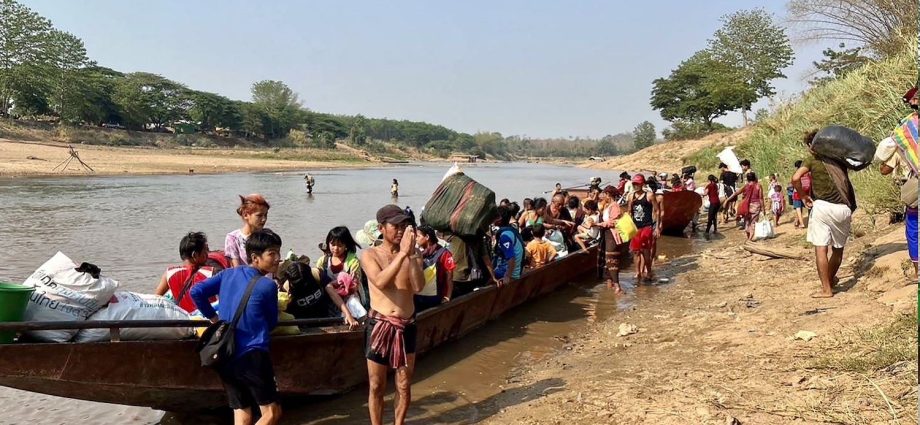Asean parliamentarians say authorities at Myanmar border must protect those fleeing violence

Parliamentarians from Southeast Asia have condemned a recent decision by Thai authorities to hand over three Myanmar opposition fighters, one of whom died after being shot while the fate of the other two remains unknown.
“For far too long, the Thai authorities have been forcing asylum seekers and refugees back to Myanmar where they are at risk of persecution. This is a clear violation of international human rights law, norms and principles,” Mercy Barends, the chair of Asean Parliamentarians for Human Rights (APHR) and a member of the Indonesian House of Representatives, said in a statement.
The three members of the anti-junta People’s Defence Force (PDF) entered the border town of Mae Sot in Tak province, across from Myawaddy in Kayin state, on April 1 seeking medical treatment, but were arrested by Thai authorities at the immigration checkpoint.
On the morning of April 4, they were sent back across the border to the junta-allied Karen Border Guard Force (BGF), who arrested them and transferred them into the custody of junta troops.
Reports subsequently emerged that the three PDF members — Thiha, the Lion Battalion’s deputy platoon commander, and fighters Htet Nay Win and Saw Phyo Lay — were killed in junta captivity. These reports could not be verified.
Lion Battalion spokesperson Anyar Thar later told Radio Free Asia that Saw Phyo Lay was shot as he attempted to escape during the handover and later died from his injuries. The status of the other two men remained unclear.
“When [the PDF fighters] learned that they were being handed over to the BGF, they jumped out of the boat that was carrying them,” he said.
“Troops from both sides shot at them. [Saw Phyo Lay] who was about to die [from his injuries] was even handcuffed, put back into the boat and sent over to the BGF. This shows how good the relations are between the BGF and Thai authorities.”
Anyar Thar said that Thiha and Htet Nay Win were sent to the junta’s Southeast Regional Military Headquarters based in the Mon state city of Mawlamyine.
The BGF has been defending Shwe Kokko, a nearby “special economic zone” effectively controlled by Chinese gangs, that has been the site of fierce fighting. The conflict has sent as many as 10,000 people from Myanmar, mostly non-combatants, across the border and into hastily arranged temporary camps in the Mae Sot area.
Local authorities in Mae Sot have reported that about 1,000 people have voluntarily returned to their home country as the clashes have eased.
In March, Thai authorities detained 83 illegal migrants from Myanmar and seized military equipment and medical supplies during a raid on some buildings in Mae Sot. There have been no follow-up reports on their status and whether the number included any fighters.
“Despite sharing an extensive border of more than 2,400 kilometres with Myanmar, the Thai government has not been welcoming to refugees who seek to escape the brutal violence of the Myanmar military,” the APHR statement said.
“Human rights groups have repeatedly criticised Thailand for sending back those who cross the border. Asylum seekers from Myanmar in Thailand also face a precarious situation, where they lack legal protection and risk being deported at any time.”
Earlier this year, the Thai government officially adopted the UN Convention Against Torture, the group noted. “Releasing these three men into the hands of the Myanmar junta, which has repeatedly arbitrarily arrested, tortured, and at times even extrajudicially executed dissidents, is clearly in violation of this convention.”
“We urge the Thai government to allow those fleeing conflict in Myanmar to enter Thailand safely and to prioritise their protection. Thai authorities must immediately halt the deportation of citizens from Myanmar who face immense risks to their physical well-being in the hands of the junta,” said Ms Barends.

